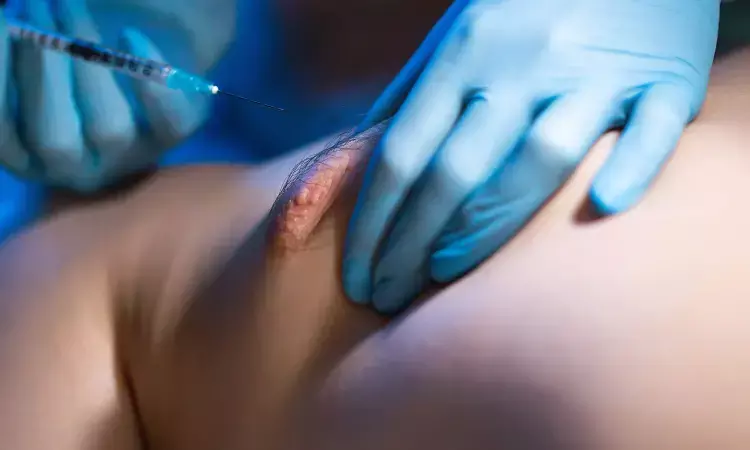- Home
- Medical news & Guidelines
- Anesthesiology
- Cardiology and CTVS
- Critical Care
- Dentistry
- Dermatology
- Diabetes and Endocrinology
- ENT
- Gastroenterology
- Medicine
- Nephrology
- Neurology
- Obstretics-Gynaecology
- Oncology
- Ophthalmology
- Orthopaedics
- Pediatrics-Neonatology
- Psychiatry
- Pulmonology
- Radiology
- Surgery
- Urology
- Laboratory Medicine
- Diet
- Nursing
- Paramedical
- Physiotherapy
- Health news
- Fact Check
- Bone Health Fact Check
- Brain Health Fact Check
- Cancer Related Fact Check
- Child Care Fact Check
- Dental and oral health fact check
- Diabetes and metabolic health fact check
- Diet and Nutrition Fact Check
- Eye and ENT Care Fact Check
- Fitness fact check
- Gut health fact check
- Heart health fact check
- Kidney health fact check
- Medical education fact check
- Men's health fact check
- Respiratory fact check
- Skin and hair care fact check
- Vaccine and Immunization fact check
- Women's health fact check
- AYUSH
- State News
- Andaman and Nicobar Islands
- Andhra Pradesh
- Arunachal Pradesh
- Assam
- Bihar
- Chandigarh
- Chattisgarh
- Dadra and Nagar Haveli
- Daman and Diu
- Delhi
- Goa
- Gujarat
- Haryana
- Himachal Pradesh
- Jammu & Kashmir
- Jharkhand
- Karnataka
- Kerala
- Ladakh
- Lakshadweep
- Madhya Pradesh
- Maharashtra
- Manipur
- Meghalaya
- Mizoram
- Nagaland
- Odisha
- Puducherry
- Punjab
- Rajasthan
- Sikkim
- Tamil Nadu
- Telangana
- Tripura
- Uttar Pradesh
- Uttrakhand
- West Bengal
- Medical Education
- Industry
Surgery for gynaecomastia improves quality of life among young men

Enlargement of the male breast, called gynecomastia, can be a source of embarrassment and distress for teens and young men. Surgery to correct gynecomastia brings significant improvement in self-esteem and almost every aspect of quality of life, reports a study in the June issue of Plastic and Reconstructive Surgery, the official medical journal of the American Society of Plastic Surgeons (ASPS). Plastic and Reconstructive Surgery® is published in the Lippincott portfolio by Wolters Kluwer.
"Our experience shows real physical, social, emotional, and other benefits of surgical correction for boys and young men with gynecomastia," comments ASPS Member Surgeon Brian I. Labow, MD, of Boston Children's Hospital, senior author of the new study. "We also show that those benefits accrue despite the relatively high rate of minor complications after male breast reduction surgery."
Complications don't limit the benefits of gynecomastia reduction
Dr. Labow and colleagues analyzed postoperative outcomes of 145 male patients, aged 12 to 21 years, undergoing surgery to correct gynecomastia. All of the young men had persistent gynecomastia that did not improve with weight loss and medical therapy. Most were overweight or obese and had more severe (grade III or IV) gynecomastia.
Surgical repair was performed in a total of 270 breasts; some patients required correction in only one breast. The researchers analyzed the effects of gynecomastia correction on quality of life, including the possible impact of postoperative complications.
Early complications occurred in about 10% of breasts. This included a 7.8% rate of hematomas (blood collections), most of which were minor; and a 2.2% rate of minor infections, which were managed with oral antibiotics. Other complications were uncommon, and no serious complications occurred. Patients whose surgery included skin removal were 2.5 times more likely to have early complications.
Later follow-up (median 8.6 months) was available in 129 patients. At this time, at least one complication had occurred in 34.3% of breasts. Complications included residual tissue in 12.6% of breasts and contour irregularities in 9.2%. Other complications (such as inverted nipples and scarring problems) were relatively rare.
Fifty-one patients had more in-depth follow-up, including preoperative and postoperative questionnaires, a median of 33.3 months after gynecomastia correction. The results showed significant improvement on a questionnaire measuring self-esteem: about 3 points higher on a scale of 10 to 40.
Patients also showed significant improvement in 7 out of 8 quality of life domains, including physical, social, and emotional functioning, and mental health. A screening test for disordered eating found no significant changes in attitudes toward food and eating.
Self-esteem and quality of life improvements are similar for patients with or without complications after gynecomastia correction. The benefits also appear independent of gynecomastia severity, surgical technique, or being overweight/obese.
In previous studies, Dr. Labow and colleagues have found that even mild persistent gynecomastia negatively affects self-esteem and other aspects of mental and emotional health in adolescent males. The new findings add to the evidence showing the mental and physical health benefits of surgery to correct gynecomastia, even when postoperative complications occur.
"These data also suggest that adolescents, while still maturing, are appropriately equipped to handle the complications associated with gynecomastia repair," Dr. Labow and coauthors conclude. "While additional studies are needed, current evidence suggests that the potential for complications should not limit treatment recommendations in younger patients with gynecomastia."
Dr Kamal Kant Kohli-MBBS, DTCD- a chest specialist with more than 30 years of practice and a flair for writing clinical articles, Dr Kamal Kant Kohli joined Medical Dialogues as a Chief Editor of Medical News. Besides writing articles, as an editor, he proofreads and verifies all the medical content published on Medical Dialogues including those coming from journals, studies,medical conferences,guidelines etc. Email: drkohli@medicaldialogues.in. Contact no. 011-43720751


